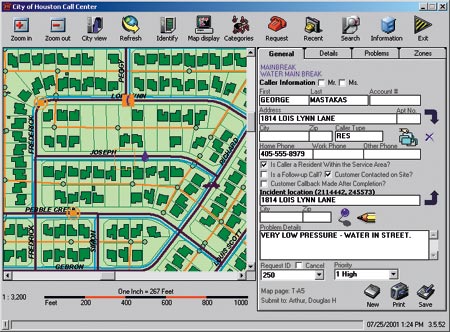City of Houston Deploys GIS-Based Infrastructure Management System
 The City of Houston Public Works and Engineering Department (PW&E) has completed its first-round deployment of its GIS-based Infrastructure Management System. The system is founded on the Azteca Systems Cityworks software suite, and the Esri Professional Services-managed project included software configuration, system integration, installation, and user training for approximately 160 users. The system performs call taking, service request generation, field investigation, work order generation, inspections, cost tracking, reporting, and system maintenance tasks.
The City of Houston Public Works and Engineering Department (PW&E) has completed its first-round deployment of its GIS-based Infrastructure Management System. The system is founded on the Azteca Systems Cityworks software suite, and the Esri Professional Services-managed project included software configuration, system integration, installation, and user training for approximately 160 users. The system performs call taking, service request generation, field investigation, work order generation, inspections, cost tracking, reporting, and system maintenance tasks.
Call handling and request generation are managed through the City's Customer Response Center, which uses the Cityworks Call Center application. Each caller (or problem location) is immediately geolocated so that the service representative can help the caller by determining if the problem being reported is associated with a previously generated service request (represented by color-coded symbols on the call taker's GIS display). If the earlier service request resulted in the generation of a work order, the call taker can also view the current status of the work order.

Call handling and request generation are managed through the City's Customer
Response Center, which uses the Cityworks Call Center application.
Incoming calls can easily be associated with existing service requests, thereby reducing the number of repeat service requests that are sent to the field for investigation.
When a service request is generated, the Cityworks software automatically assigns the service request to a specific service area and individual service truck based on a polygon-based assignment grid managed by the Cityworks Truck Assignment System.
As soon as a service request has been entered into the system, it immediately becomes available to the service request investigators working in the field using the Wireless  Cityworks module. Using their always-active cellular modem WAN connections, the City of Houston service request investigators download new service requests and upload completed (closed) service requests several times each hour. Every event in the process is electronically time-stamped for legal recording purposes to include the time the service request was generated, when it was downloaded, when it was first opened, and when it was completed (requiring further action) or when it was closed (problem solved). Labor and incidental material costs are also captured using the Wireless Cityworks module, thereby eliminating time sheets in the field (and duplicate data entry in the office). The Wireless Cityworks module also includes a GIS map display, which allows the investigator to see and query all the service requests assigned to him or her and to see the full water, sewer, and storm water facility network layers.
Cityworks module. Using their always-active cellular modem WAN connections, the City of Houston service request investigators download new service requests and upload completed (closed) service requests several times each hour. Every event in the process is electronically time-stamped for legal recording purposes to include the time the service request was generated, when it was downloaded, when it was first opened, and when it was completed (requiring further action) or when it was closed (problem solved). Labor and incidental material costs are also captured using the Wireless Cityworks module, thereby eliminating time sheets in the field (and duplicate data entry in the office). The Wireless Cityworks module also includes a GIS map display, which allows the investigator to see and query all the service requests assigned to him or her and to see the full water, sewer, and storm water facility network layers.
Above left: The City of Houston service request investigators download new service requests and upload completed service requests.
The new system replaces a beleaguered and error-prone mainframe and paper-based system that relied heavily on voice communication over a crowded radio network. Status reporting was mostly paper-based, meaning that it often took a day or more to process the results of an investigation (during which time more service requests reporting the same problem were often generated). With the new system, all requests are dispatched and status reports are received electronically, dramatically increasing the speed and efficiency of the entire process and improving customer service.
Since the initial system start-up in June 1999, PW&E has processed more than 245,000 service requests and 140,000 maintenance and inspection work orders with the new system.
PW&E has just begun a second round of deployments to the system including the addition of 150 Compaq iPAQ Pocket PC computers that will bring the total number of system users to more than 300. The new Pocket PCs will be running the latest version of Wireless Cityworks software.
Other possible enhancements to the new system under consideration are street-level-based vehicle routing and biometrics-based system access security.
For more information, please contact Brian Hoefer, project manager, Esri (tel.: 909-793-2853, ext. 1-1626; e-mail: bhoefer@esri.com).
